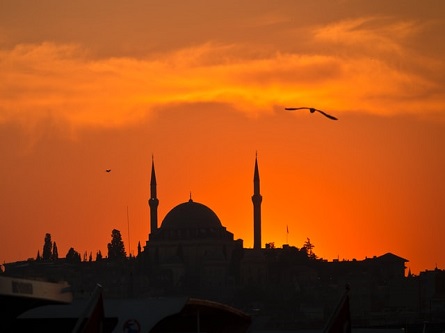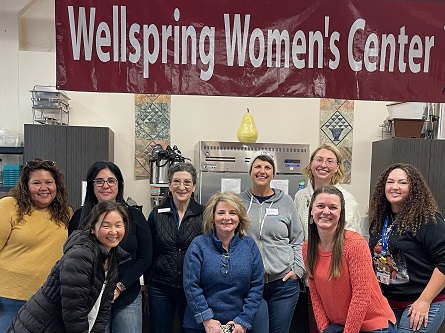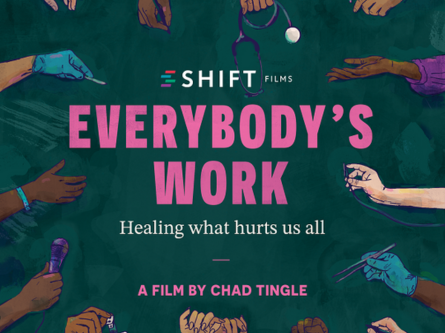In sharing this reflection, it is my hope that our medical community learns more about the deep spiritual value that this holy month holds for Muslims, and uses this awareness to accommodate the needs of Muslim patients and providers. —Aafreen Mahmood
By Aafreen Mahmood, MSPH
MD Candidate, Class of 2023
UC Davis School of Medicine
Ramadan is the ninth month of the Islamic calendar, in which the first verses of the Holy Qur’an were revealed. In this month, over 1 billion Muslims worldwide abstain from food and drink from dawn to sunset, immersing themselves in acts of worship, supplication, and charity. In addition to rejuvenating the spiritual state of a Muslim, Ramadan also serves a communal purpose. Pre-COVID 19, mosques around the world were packed with Muslims breaking their fast together and engaging in nightly congregational prayers on a daily basis.
Every Muslim’s experience with Ramadan is different – and yet in so many ways, it is somehow still the same. For myself and the millions of first-generation Muslim Americans, Ramadan has become an opportunity for us to embrace our identity, cherish sacred faith traditions, and continue the legacy of our ancestors.
Growing up as one of the few students in my school district wearing the hijab (Islamic headscarf) in a post-9/11 era, Ramadan was yet another reminder of how different I was from my peers. Explaining to my non-Muslim peers why I was not eating or drinking with them during lunch time or class parties often raised mixed reactions. Many were shocked, posing the infamous question, “Not even water?!”, while others in PE class did not hold back in expressing their pity: “You poor thing, you must be so hot running in that and fasting too.” Others were less kind, shoving food and water into my face to tempt me.
At the time, these experiences were unsettling and compelled me to dispel misconceptions about my faith posing undue hardship upon me. Looking back, however, I now understand that for many of my non-Muslim peers, the concept of abstaining from food and water for 16 hours daily for a month with no tangible reward (save the few pounds you shed) just seemed strange.
And yes, in some ways, it does feel strange to suddenly forego the diet you had for the past 335 days. But there is something truly sacred about sacrificing our daily routines and conveniences for a larger purpose, in submission and obedience to our Creator. As is mentioned in the Qur’an:
"O you who have believed, fasting is ordained upon you as it was ordained upon those before you so that you may obtain God-consciousness"(The Qur'an, 2:183).
During other times of the year when life stressors and obligations pull us in various different directions, it can be easy to slip in our religious duties. Fasting re-centers us, and instills within us a spiritual closeness to God and humility that is like no other. Since fasting does not involve any public displays of religiosity, it is considered to be one of the most sincere acts of worship - one that remains hidden between you and God. Through fasting, we ultimately learn that in abstaining from that which is permissible (food and drink), we have the tenacity, patience, and moral discipline to abstain from that which is impermissible, such as gossip, addiction, or dishonesty.
In essence, Ramadan shows us who we are and who we have the potential to become.
For many of us first-generation Muslim Americans, Ramadan was also the annual reminder we needed to take pride in our identity and heritage. My fondest Ramadan memories include learning traditional recipes passed down from generations of women in my family, feeding neighbors and educating them about our religious holidays, spending late nights in prayer with family and friends, decorating our house and mosque, and dressing up in ethnic clothes to celebrate Eid al-Fitr at the end of Ramadan. These are traditions I look forward to passing down to future generations of Muslims in my family and community.
In reflecting on the many Ramadans that I have been blessed to experience in my lifetime, I appreciate the shift in how we as a society have come to recognize this religious holiday –
Ramadan decorations in my local Party City store, local diners reserving sections for Muslims coming to eat after late night prayers, texts from non-Muslim peers and colleagues wishing my family and I a blessed Ramadan. Twenty years ago, I would have never imagined this.
In sharing this reflection, it is my hope that our medical community learns more about the deep spiritual value that this holy month holds for Muslims, and uses this awareness to accommodate the needs of Muslim patients and providers. Offering a space in your facility for prayer or rest during the day, hosting get-togethers involving food after fast breaking hours, assigning students and residents to lighter rotations or shorter commutes to sites, and scheduling medical procedures around patients’ fasting schedule all go a long way in showing your solidarity. For myself at least, these small gestures have helped me as a Muslim American feel more seen, and ultimately demonstrate that my faith traditions can indeed be embedded within the fabric of American society.
Ramadan Kareem.





